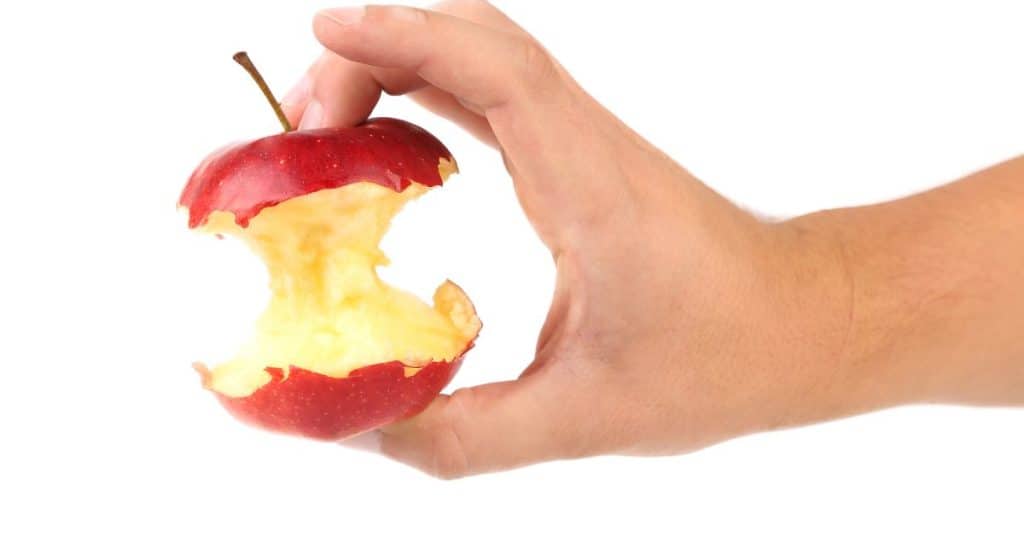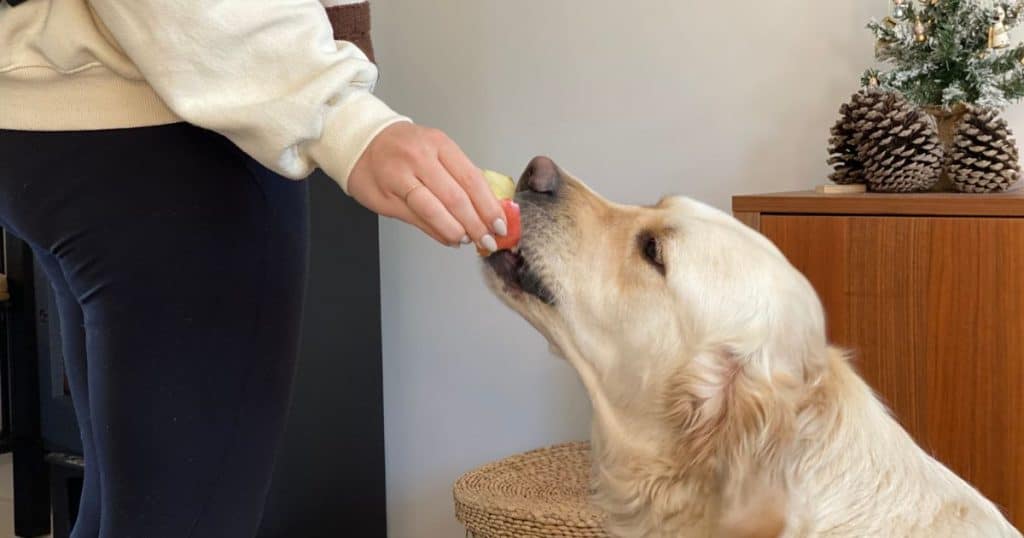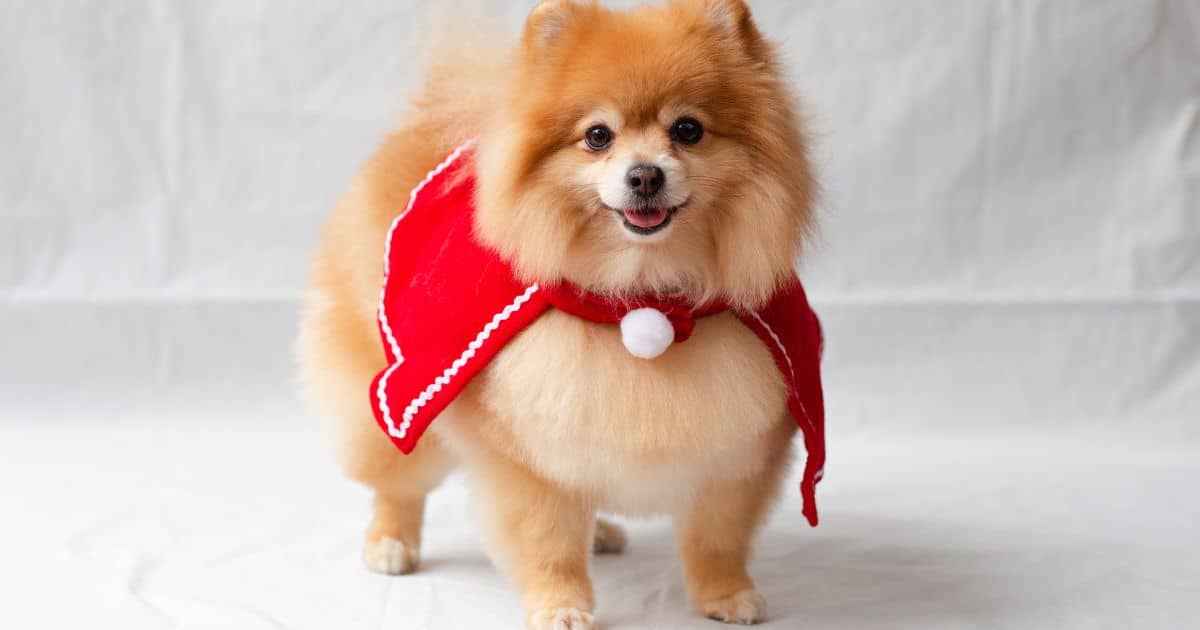Table of Contents
As a dog owner, it’s natural to want to share your favorite foods with your furry friend. Apples are a healthy and delicious snack for humans, but can dogs eat apple cores? This is a common question among pet owners, and the answer is not as straightforward as you might think.
While apples are generally safe for dogs to eat, the core and seeds can pose a potential risk. Apple seeds contain a small amount of cyanide, which can be toxic in large quantities. However, the amount of cyanide in apple seeds is generally not harmful to dogs, and the seeds are quickly metabolized by their bodies.
In this article, we’ll explore whether dogs can eat apple cores and seeds, and the potential risks and benefits of feeding them this popular fruit.
We’ll also provide tips on how to safely prepare apples for your dog and suggest other healthy snacks you can share with your furry friend.
Can Dogs Eat Apple Cores?

What are Apple Cores?
Apple cores are the center part of an apple that includes the stem, seeds, and tough fibrous center. Some people may be tempted to give their dogs the apple core as it seems like a waste to throw it away.
However, it’s important to understand the potential risks involved in feeding apple cores to your furry friend.
Are Apple Cores Safe for Dogs?
No, apple cores are not safe for dogs to eat. The tough center of an apple is a choking hazard, and the seeds contain very small amounts of cyanide. While a small amount of cyanide may not be harmful, it’s best to avoid feeding apple cores to your dog altogether.
Risks of Feeding Apple Cores to Dogs
Feeding apple cores to your dog can lead to various health risks. The tough center of an apple can cause choking or blockages in your dog’s digestive system. The seeds contain small amounts of cyanide, which can be toxic if consumed in large quantities. Symptoms of cyanide poisoning include difficulty breathing, dilated pupils, and vomiting.
It’s important to note that the amount of cyanide in apple seeds is generally not enough to cause harm. However, it’s best to avoid feeding apple cores to your dog altogether to prevent any potential risks.
Benefits of Feeding Apples to Dogs

Nutritional Value of Apples
Apples are a great source of vitamins and minerals that can benefit your dog’s health. They are low in fat and calories, making them a great snack option for overweight dogs. Apples are also a good source of fiber, which can help regulate your dog’s digestion and keep them feeling full.
One medium-sized apple contains approximately:
| Nutrient | Amount per Serving |
|---|---|
| Fiber | 4 grams |
| Vitamin C | 8.4 mg |
| Vitamin A | 98 IU |
| Potassium | 195 mg |
Health Benefits of Apples for Dogs
Feeding your dog apples can provide several health benefits. The high fiber content in apples can improve your dog’s digestion and help prevent constipation. Apples also contain antioxidants, which can help boost your dog’s immune system and reduce the risk of diseases like cancer.
Additionally, the natural sweetness of apples can make them a great alternative to processed dog treats that are high in sugar and preservatives. Apples can also help freshen your dog’s breath and clean their teeth, reducing the risk of dental problems like plaque and tartar buildup.
However, it is important to note that apples should be fed to dogs in moderation. Too many apples can cause digestive upset or diarrhea, and the seeds and core should be removed as they can be a choking hazard or contain small amounts of cyanide.
Preparation and Serving of Apples for Dogs

How to Prepare Apples for Dogs
When preparing apples for your furry friend, it is important to remove the core and seeds as they can be a choking hazard and contain small amounts of cyanide. Cut the apple into bite-sized pieces and remove the stem and leaves. It’s best to serve the apple fresh and raw, as cooking can reduce its nutritional value.
Serving Size and Frequency
While apples are a healthy snack for dogs, they should be given in moderation. Too much apple can cause an upset stomach or diarrhea. A good rule of thumb is to give your dog no more than one or two slices of apple per day, depending on their size. Always monitor your dog’s reaction to new food and adjust the serving size accordingly.
Alternatives to Apple Cores
If you prefer not to give your dog apple cores, there are alternatives you can try. You can offer your dog slices of cucumber, watermelon, or banana as a healthy snack. These fruits are low in calories and high in vitamins and minerals, making them a great addition to your dog’s diet.
In conclusion, apples can be a healthy and tasty treat for your dog, but it is important to prepare them properly and serve them in moderation. Always monitor your dog’s reaction to a portion of new food and consult with your veterinarian if you have any concerns about your dog’s diet.
Before You Go
After researching and analyzing the information provided by the search results, it is clear that dogs can eat apples, but apple cores should be avoided. While apple cores themselves are not harmful to dogs, the seeds within the core contain a compound called amygdalin, which can be toxic to dogs if consumed in large quantities.
If your dog accidentally eats an apple core, monitor them for any signs of digestive issues like vomiting or diarrhea. If you notice any symptoms, it’s best to take your dog to the vet right away. However, if your dog only ate a small amount of apple core, they will likely pass it without incident.
It’s important to remember that while apples are a healthy snack for dogs, they should always be given in moderation. Too much apple can lead to digestive upset and diarrhea. Additionally, it’s important to always remove the core and seeds before giving your dog an apple to avoid any potential health risks.
In conclusion, while dogs can eat apples, it’s best to avoid giving them apple cores to ensure their safety and health. Always monitor your dog’s behavior and consult with your vet if you have any concerns about their diet or health.




Leave a Reply
You must be logged in to post a comment.